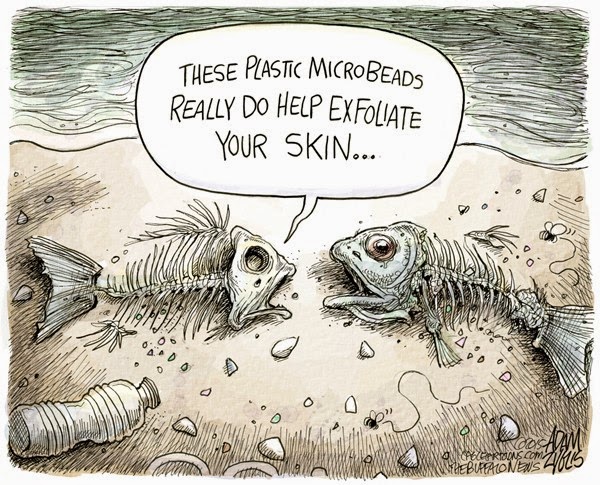Time to ban the beads
We all want our teeth to be clean after brushing, and our bodies to be clean after showering, but did you know the products used in these everyday activities could be harming wildlife? Hundreds of commonly-used household products contain tiny plastic microbeads, which can be a big problem for our environment.

We all want our teeth to be clean after brushing, and our bodies to be clean after showering, but did you know the products used in these everyday activities could be harming wildlife?
Tiny beads, big problem
Hundreds of commonly-used household products contain tiny plastic microbeads, which can be a big problem for our environment. Microbeads are just one part of the plastic-pollution problem in our oceans, lakes and rivers, but are a special concern because they’re designed to go down the drain. In most cases, microbeads are so tiny that they slip through wastewater treatment and into nearby waterways.
Even at conservative estimates, the collective total of microbeads being produced today is staggering. A recent study estimated that 8 trillion microbeads per day are emitted into aquatic habitats in the United States.
Another problem with this type of pollution is that plastics absorb toxic pollutants found in water such as pesticides and motor oil. A single microbead can be many times more toxic than the water around it.
Fish and other wildlife mistake microbeads for food, and when they eat them, toxins build up in their bodies and travel up the food web, potentially even to the top of the food chain: people. The documented adverse health effects in wildlife from digesting microbeads includes cellular necrosis, inflammation and lacerations of the digestive tract, liver toxicity, and disruption of the endocrine system.
Big problem, simple solution
That’s the bad news. The good news is that there is a simple solution: ban microbeads.
Banning microbeads from personal use is pretty easy to do. Just check the label for polyethylene or polypropylene, which are the most commonly-used plastics. There’s also a free app that lets you easily check to see if products contain microbeads by scanning barcodes with your smart phone. You won’t even have to stop using “microscrubbers,” as there are numerous natural, environmentally-responsible alternatives that have been used effectively for decades for this purpose.
Making a personal commitment to not purchase products that contain microbeads is commendable, but it won’t take the product off the shelves for others to buy. We need comprehensive legislation to ensure that happens.
More than a dozen states have already banned, partially banned, or are considering banning microbeads. In June 2014, Illinois became the first state to partially ban microbeads in personal care products, and earlier this month, California became the latest, with the most comprehensive ban to date. Where states have failed to enact bans, some counties are banning them.
The local bans vary in their effectiveness. Most have industry-created loopholes for the use of so-called biodegradable plastics, which may still be toxic and break down slowly in aquatic environments. Other bans only address certain products, and do not address the myriad of products that contain microbeads such as cosmetics, deodorants, lotions, and cleaners.
Personal commitment and local bans are a great start, as is the industry beginning to police itself. Several companies are making pledges to stop the use of plastic microbeads in their products. However, some companies have also worked to weaken state bans by allowing “biodegradable” plastics.
Thankfully, there is already a vehicle to ban microbeads in the U.S. Congress. The Microbead-Free Waters Act of 2015 is receiving support from both sides of the aisle. Of the House bill’s 32 cosponsors, five are Republicans, and of the eight cosponsors of the Senate bill, two are Republicans. Former Republican presidential candidate Wisconsin Governor Scott Walker is one of the governors who signed a state ban into law.
Unfortunately, the bill is nowhere near comprehensive. As written, it would only ban microbeads in cosmetics, and not in any other personal care products such as toothpaste and soap. There’s still time to shape this bill for the better.

The Microbead-Free Waters Act is a great start, but it could be so much more. Please join us in calling on Congress to pass a comprehensive bill that bans all plastics in all personal care products.
